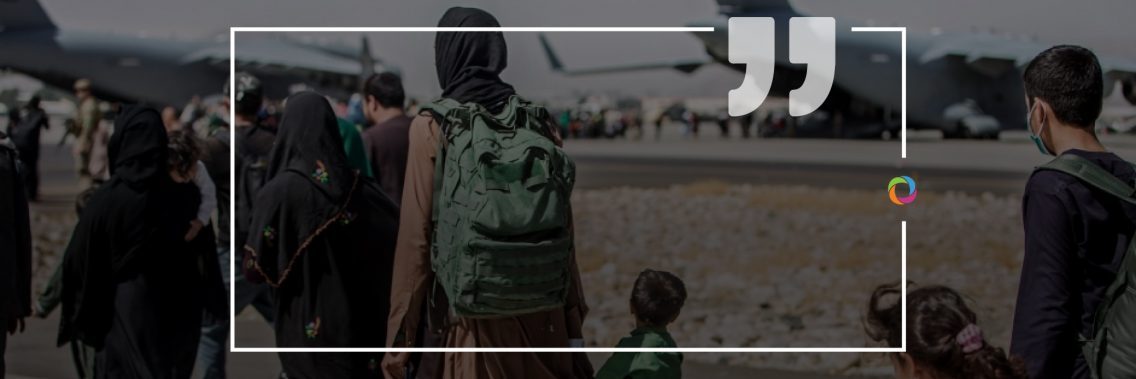Fear, disappointment, uncertainty these are just a few of the words heard among the Afghan people after the Taliban takeover. America’s withdrawal from Afghanistan has also caused fears of a repeat of Europe’s 2015 migration crisis when more than a million people from the Middle East fled to the continent and resettled there. Will the Taliban takeover trigger a new refugee crisis for Europe? Check out some expert opinions below.
Will there be a mass exodus from Afghanistan?

“Besides a few thousand Afghans evacuated by departing military forces from the United States, Canada, Australia, Ukraine, Sweden, and other countries since the takeover of Kabul and the country by the Taliban in mid-August, an estimated 500,000-plus internally displaced persons and an equal number of others have fled Afghanistan. Most individuals able to leave have crossed over to Iran and Pakistan who between them have now received and hosted several million Afghan refugees for decades. An NGO colleague recently advised that since the takeover, some 1,700 Afghans are entering Iran every day. People are fleeing Afghanistan due to security concerns, a quickly deteriorating human rights situation, and general uncertainty of what the future will bring under Taliban rule. These numbers suggest there is already a significant exodus of Afghans seeking asylum that can be expected to continue if people are able to leave, whether through formal or informal channels.”
How will Europe react to a mass exodus of refugees at this time?

“It has been reported that some European politicians have said that their countries will not accept new arrivals of Afghan asylum seekers. Such statements are unhelpful and largely playing to the public. When asylum seekers attempt to enter a European or other country to seek asylum, under the provisions of international law they are obliged to permit these individuals to enter and make an application. Most European countries have enacted domestic laws and policies to process and deal with asylum seekers and refugees, and restrictive distinctions cannot be made to treat Afghans differently. On the contrary, by all accounts, those Afghans currently leaving the country, especially women and girls and activists and people who have worked with international and western diplomatic missions, may have acute protection needs that cannot be ignored. All people, regardless of their country or place of origin, should be able to seek and enjoy asylum from persecution. Furthermore, asylum seekers and refugees must be offered assistance and support consistent with a state’s legal obligations under international law including the 1951 Refugee Convention and 1967 Protocol, other UN human rights treaties, and the 1950 European Convention on Human Rights. Ensuring the implementation of these rights requires political commitment and, in some instances, resources but in the context of Europe, it should be remembered that some 80% of the world’s refugees and other forcibly displaced persons are currently living in the Global South. That reality is unlikely to change. By comparison, the number of asylum seekers entering Europe is neither alarming nor unmanageable. However, if the number of Afghan asylum seekers significantly increases, it can be expected that some European governments will knowingly ignore or attempt to bypass their international legal obligations and shift responsibility to other regions. There are a variety of ways and means that can be employed to both support and assist, as well as discourage, prevent and deter asylum seekers from traveling to Europe. These measures may include agreements with countries, especially near Afghanistan or outside the European region, to help asylum seekers and refugees “closer to home”. Indeed, the engagement of entities such as the Office of the UN High Commissioner for Refugees (UNHCR), the International Organisation for Migration (IOM) and local government authorities can play into this process. A blunter approach employed is to push back boats of asylum seekers or refuse disembarkation, refuse entry at border checkpoints, erect fences and other physical obstructions and detection mechanisms to identify individuals attempting to cross borders through irregular means and, for those people fortunate enough to enter the territory of a particular country, long-term immigration detention or poor reception conditions is what may await them. The backlog of asylum claims in Europe and resource concerns is a further consideration that will have a bearing on how generous or otherwise European states decide to be with new arrivals. There is no easy way forward, but European states need to set good examples and adhere to their legal and humanitarian obligations.”
What leverage do Western countries have on the Taliban?

“For decades, the Taliban has been and remains a major political and military force in Afghanistan. With the recent takeover, they have once again (the Taliban previously ruled the country starting in 1996 for several years) established themselves in a national leadership position. It can be expected that the longstanding relationship between many governments and the Taliban leadership will continue. Similarly, UN representation and agencies such as the International Commission of the Red Cross/Red Crescent and international non-governmental organisations, some of whom have been operating in Afghanistan for many years, will continue their engagement with the Taliban. In that sense, diplomatic and other relations between largely western-financed and supported UN and other humanitarian entities permits continued dialogue and pathways for advocacy on how, ideally, the Taliban should embrace a human rights-based and gender responsive approach to governance to gain legitimacy and acceptance and, most importantly, protect the people of Afghanistan. People expect to be protected and not harmed by their government. They also need reliable government-based structures and institutions to provide services including accessible quality education for all, healthcare, urban infrastructure, rule of law and economic security. The failure of the Taliban to deliver on these objectives will lead to increased hardship for the population, especially women and girls, and result in failure to establish economic and diplomatic relations with other countries, and more people will leave. The failure of the Taliban to ensure the welfare of the people of Afghanistan consistent with human rights and gender equality norms may even attract the imposition of economic and other sanctions which will further isolate the country. Currently, one-third of the Afghan population of some 39 million people relies on humanitarian assistance for their next meal. One cannot expect the Taliban to simply go away or lose control of the country since they seized power on April 15. It can be expected that, having established a national government, they may soon seek formal recognition from the UN. Recognition of the Taliban as the governing authority of the country can also take place through bilateral relations, as some states have already done. Western countries need to deal with the Taliban with open eyes and in good faith, but also with a healthy degree of concern and skepticism.”
What should the international community do in this regard?

“There are several things the international community can do and, while the following points are not exhaustive, there are some priorities. One, humanitarian assistance and support through the UN and international and local non-governmental organisations to support the people of Afghanistan must continue. This includes supporting humanitarian programs and other assistance measures in countries hosting enormous numbers of Afghans in the region, notably Iran and Pakistan. Two, diplomatic or other forms of relations and dialogue with the Taliban should be rigorously pursued. To have meaningful discussions and have a chance of promoting a human rights-oriented approach during the formation of the state, ongoing and new channels of communication should be strengthened and established. Three, urgent protection measures for vulnerable individuals facing retaliation or harm must continue through permitting and assisting such persons to leave Afghanistan. Some commentators have suggested establishing safe zones or humanitarian corridors for this purpose. In the absence of UN Security Council approval, which may be difficult to secure, doing so may require the cooperation and permission of the Taliban authorities. Four, government authorities receiving new arrivals of Afghans should permit them to enter their territories and extend the option to seek and gain asylum. In doing so, protection and humanitarian assistance consistent with obligations under international law and best practices should be provided. Five, any form of bilateral or third-country arrangements between nation-states concerning Afghan asylum seekers and refugees need to respect international human rights and refugee legal standards. Of key importance, no one should be expelled or otherwise forcibly returned to Afghanistan or to a place where they risk such return against their will. Six, for countries already hosting Afghan asylum seekers or refugees, including rejected asylum seekers, any return to Afghanistan or other countries where there is a risk of them being returned should be suspended. Seven, and of particular importance, is that the voices of ordinary Afghans and especially women and girls are heard and considered in planning any assistance or policy measures. The best way to ensure buy-in and acceptance of any interventions is if the beneficiaries can meaningfully participate in, contribute to and support the process. Eight, after two decades of the latest military occupation in Afghanistan by external parties, it is time to support peace and reconciliation and state-building. The Afghan people deserve and need support and the international community through all the considerable means at its disposal can and should provide it.”
Check out more than 70 job opportunities in the migration sector here.

